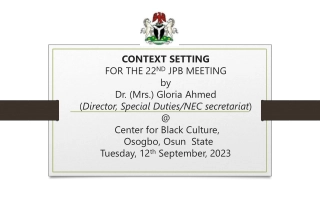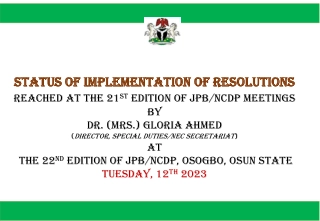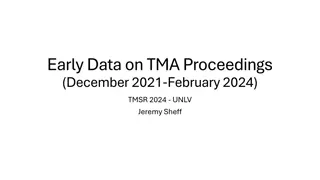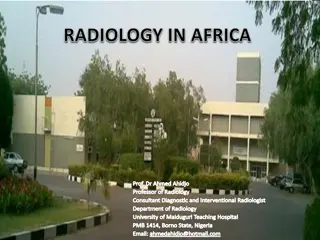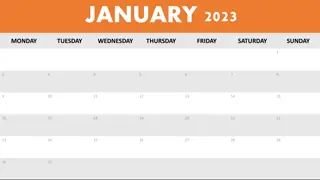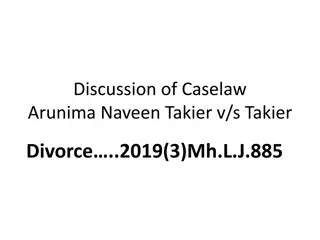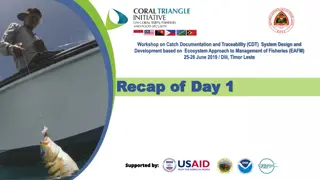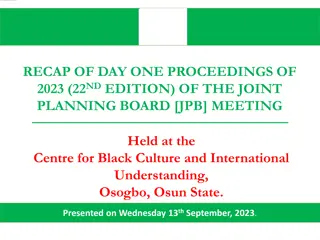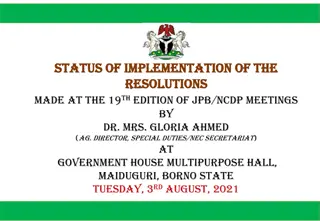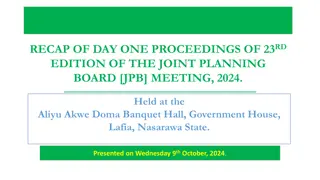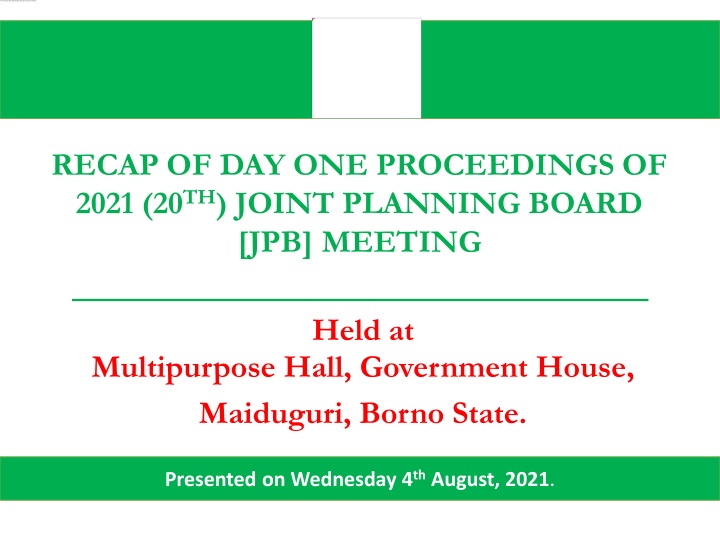
Insights from 2021 Joint Planning Board Meeting in Maiduguri, Borno State
Discover key highlights from the 2021 Joint Planning Board Meeting in Maiduguri, Borno State, including the introduction, opening session, technical discussions, and key comments on sustainable development planning challenges. Explore how stakeholders aim to tackle humanitarian and security issues in Nigeria for sustainable economic growth.
Download Presentation

Please find below an Image/Link to download the presentation.
The content on the website is provided AS IS for your information and personal use only. It may not be sold, licensed, or shared on other websites without obtaining consent from the author. If you encounter any issues during the download, it is possible that the publisher has removed the file from their server.
You are allowed to download the files provided on this website for personal or commercial use, subject to the condition that they are used lawfully. All files are the property of their respective owners.
The content on the website is provided AS IS for your information and personal use only. It may not be sold, licensed, or shared on other websites without obtaining consent from the author.
E N D
Presentation Transcript
RECAP OF DAY ONE PROCEEDINGS OF 2021 (20TH) JOINT PLANNING BOARD [JPB] MEETING Held at Multipurpose Hall, Government House, Maiduguri, Borno State. Presented on Wednesday 4th August, 2021.
1.0 INTRODUCTION The 2021 (20th Edition) of the JPB meeting held at the Multipurpose Hall, Government House, Maiduguri, Borno State on Tuesday, 3rd August, 2021 with the theme Managing the Nigerian Economy for Sustainable Development in a Challenging Environment was formally declared open by Alhaji Usman Jidda Shuwa, fwc; the Secretary to the Government of Borno State. The meeting was convened as hybrid (physical and virtual). The participation was impressive with 472 in attendance (455 physically and 17 virtually) drawn from the Federal Ministries, Departments and Agencies (MDAs), States, Private Sector, Civil Societies, Development Partners, NGOs, Academia, and Media. 20 States and FCT namely Adamawa, Anambra, Bauchi, Bayelsa, Benue, Borno, Delta, Enugu, Gombe, Kaduna, Kano, Kebbi, Kogi, Nasarawa, Niger, Plateau, Sokoto, Taraba, Yobe and Zamfara were in attendance. 2
2.0 OPENING Hajia Maryam Shehu, fna; the Permanent Secretary, Ministry of Finance, Budget and Economic Planning, Borno State gave the Welcome Address while Mrs. Olusola O. Idowu, the Permanent Secretary, Budget & National Planning, Abuja gave the Opening Remarks. Alhaji Usman Jidda Shuwa, fwc the Secretary to the Government of Borno State delivered the Keynote Address. Goodwill Messages were also delivered by the United Nation Resident and Humanitarian Coordinator ably represented by his Deputy Head; the President, An-Ansar Foundation ably represented by the Registrar/ Chief Executive, ICAN; and the Vice Chancellor, Federal University of Kashere, Gombe State Dr. (Mrs.) Gloria K. Ahmed, the Acting Director, Special Duties (FMFBNP) set the Agenda for the meeting. 3
3.0 TECHNICAL SESSIONS The first day featured one (1) Technical Plenary Session, viz.-a-viz; Tackling Humanitarian Challenges . Three (3) Parallel Sessions were held in plenary the sub-theme: Managing Insecurity in Nigeria . A total of six (6) papers were presented by Resource Persons, including a lead paper on Managing the Nigerian Economy for Sustainable Development in a Challenging Environment. Other papers included; Status Report of the Implementation of Key Resolutions of the 19th Edition of the JPB/NCDP Meetings; Strategic Approach towards addressing Humanitarian Challenges in Nigeria; Security Challenges in Nigeria: Implications for Sustainable Economic Growth and Development; Insecurity in Nigeria: Causes, Consequences and Solutions; and Managing Humanitarian Issues through the MTNDP 2021-2025 and Agenda 2050. 4
4.0 KEY COMMENTS AND OBSERVATIONS Planning for Recovery, Resilience and Inclusion Lack of Coordination across all tiers of Government, intersectoral as well as inability to generate credible, timely and reliable data were identified as major hinderance for sustainable development planning; The need for States and Local Governments Plans to draw inspiration from National Plans to achieve balanced development; and On planning for inclusion, it was observed that there is disconnect between the policy and the people, hence the need to strengthen the linkage. Status Report on the Implementation of key Resolutions of the 19th Edition of the JPB/NCDP Meetings The FMFBNP should develop a clear and uniform reporting template to enable States provide the correct information on the status of implementation of key JPB/NCDP resolutions; Trackling of implementation of the resolutions of the JPB/NCDP meetings should leverage on actions taken by various States and the Federal Government after the meetings; and As observed, there should be follow-up on States who are lagging behind in forwarding their template, in order to ensure that all States are carried on board. 5
4.0 KEY COMMENTS AND OBSERVATIONS [CONTD] Strategic Approach towards addressing Humanitarian Challenges in Nigeria Humanitarian responses should be localized as much as possible for sustainability of the economy; The provision of Education and other empowerment programmes for deserving IDPs was identified as one of the ways to address humanitarian crisis in Nigeria; There is need to put-in-place pro-active measures to checkmate emerging crisis and be resilient in self-sustainability instead of distribution of relief materials; and Resettlement of people from the flood zones was observed as a preventive measure. Security Challenges in Nigeria: Implications for Sustainable Economic Growth and Development The high level of insecurity in Nigeria cannot guarantee sustainable economic growth and development; and The security challenges faced in the country have hindered both local and foreign investment which invariably has slow down economic growth, employment and development. 6
4.0 KEY COMMENTS AND OBSERVATIONS [CONTD] Insecurity in Nigeria: Causes, Consequences and Solutions All tiers of Governments must collaborate rather than work in silos in order to achieve food security and guarantee growth in Agriculture; and The need to strengthen the Agro-Rangers programme in order to provide security for the farmers as well as provide more resources to farmers to improve their farming activities. Managing Humanitarian Issues through the MTNDP 2021-2025 and Agenda 2050 Humanitarian issues as being addressed today is not optimal, rather distribution of palliatives is like scratching the issue on the surface; The need for proactiveness in the sense of preventing or pre-empt occurrence rather than palliative measure; NBS has power not only to ensure availability of robust data but also support institutions and the sub-nationals in generating data at all levels; Gender inequality, unemployment, improper care of the IDPs by the States and Federal Government were identified among humanitarian issues and captured in the MTNDP 2021-2025 and Agenda 2050. 7
5.0 KEY DECISIONS AND RECOMMENDATIONS Managing the Nigerian Economy for Sustainable Development in a Challenging Environment Factors hindering economic growth, employment, support for business should be addressed at all levels of Goivernment in order to achieve balance and sustainable development in a changing environment; States to objectively create and sustain growth poles as well as ascertain baseline of their current GDP and developments in order to track progress; National and Sub-national Governments should create ecosystems based on the comparative advantage of different economic corridors as a central part of a national strategy; States should reach out and collaborate with the National Bureau of Statistics (NBS) to build their capacity for reliable and efficient data for planning purpose; and States should strenthen their M&E Systems as well as Management Information Systems (MIS) to enhance delivery of programmes as well as track impact. Status Report on the Implementation of key Resolutions of the 19th Edition of the JPB/NCDP Meetings The Secretariat should be strengthened to effectively track implementation of the key resolutions of the annual JPB/NCDP meetings for sustainable development; The Secretariat should circulate the draft report on the implementation of key resolutions of the JPB/NCDP to States for confirmation of submission between a period of 2 - 4 weeks before final report is produced. 8
5.0 KEY DECISIONS AND RECOMMENDATIONS [CONTD] Strategic Approach towards addressing Humanitarian Challenges in Nigeria Humanitarian Programmes/ Interventions to be integrated into all aspects of governance for effectiveness and sustainability; Both National and Sub-national Governments should engage the Youth more in productive ventures and enlightment programmes to ensure inclusiveness; National and Sub-national Governments should ensure a centralized coordination of intervention through the use of technology in order to ensure that every intervention reached its destination; and States to adopt a regional approach in addressing issues around humanitarian crisis, almajiri and security challenges. Security Challenges in Nigeria: Implications for Sustainable Economic Growth and Development The Federal Government to develop a strong and equipped Military and Paramilitary Forces; The establishment of Armed Forest Guards and Armed Border Guards with modern surveillance devices by the Federal Government and States. 9
5.0 KEY DECISIONS AND RECOMMENDATIONS [CONTD] Insecurity in Nigeria: Causes, Consequences and Solutions States should ensure that at least 10 per cent of their budget are dedicated to Agriculutural development in line with the Malabo/ Maputo Declaration in order to accelerate national development and food security; and Both National and Sub-National Governments should make Agriculture more attractive to all Nigerians especially the Youths to reduce unemployment and insecurity. Managing Humanitarian Issues through the MTNDP 2021-2025 and Agenda 2050 National and Sub-national Governments to advocate performance measurement through effective monitoring and evaluation mechanism; The promotion of MSMEs, implementation of Disability Act, infrastructural development with focus on rural developments, inclusive healthcare and education, access to resources etc were recommended in solving the lingering humanitarian issues in Nigeria; As a core goal of the MTNDP 2021-2025, States should adopt the principle of inclusiveness and openess in plan formulation and implementation that will provide lasting solutions to humanitarian crises in Nigeria. 10
Thank You 11

